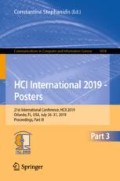Abstract
This paper highlights over a decade of research on emerging technologies and learning innovation by the National Research Council, starting in 2008 with Personal Learning Environments (PLEs), connectivist-type MOOCs (cMOOCs) and more recently, new learning ecosystems. Late breaking research on human factors involved in critical learning on an open network will highlight participants’ experiences in a recent cMOOC on distributed learning technologies - E-Learning 3.0. Human factors research is essential in identifying the types of support structures needed to create a place or community where people feel comfortable, trusted, and valued, as part of critical learning on an open network. Gaps and limitations in current research and development efforts in the area of new learning ecosystems are addressed as well as future areas of research worth exploring.
Access this chapter
Tax calculation will be finalised at checkout
Purchases are for personal use only
References
Van Harmelen, M.: Personal learning environments (2006). https://pdfs.semanticscholar.org/3a80/0f41a3431cd05b37e882c34dc434aa27bbf3.pdf
Wilson, S.: Architecture of virtual spaces & the future of VLEs (2005). https://www.slideserve.com/Sophia/architecture-of-virtual-spaces-the-future-of-vles
Downes, S.: Design elements in a personal learning environment. Half an hour blog (2015). https://halfanhour.blogspot.com/2015/03/design-elements-in-personal-learning.html
Weller, M.A.: Pedagogy of abundance. Span. J. Pedagogy 249, 223–236 (2011)
Downes, S.: What connectivism is [Web log post] (2007). http://halfanhour.blogspot.ca/2007/02/what-connectivism-is.htm
Siemens, G.: What is the theory that underpins our moocs? (2012). http://www.elearnspace.org/blog/2012/06/03/what-is-the-theory-that-underpins-our-moocs/
Bell, F.: Connectivism: its place in theory-informed research and innovation in technology-enabled learning. Int. Rev. Res. Open Distance Learn. 12(3), 98–118 (2011). http://www.irrodl.org/index.php/irrodl/article/view/902/1664
Daniel, J.: Making sense of MOOCs: musings in a maze of myth, paradox and possibility. J. Interact. Media Educ. 2012(3), (2012). https://jime.open.ac.uk/articles/10.5334/2012-18/
Downes, S.: Connectivism dynamics in communities. https://halfanhour.blogspot.com/2009/02/connectivist-dynamics-in-communities.html
Downes, S.: The MOOC of one (2014). https://www.slideshare.net/Downes/2014-03-10-valencia
Kop, R., Carroll, F.: Cloud computing and creativity: Learning on a massive open online course. EURODL, 1–11 (2011). http://www.eurodl.org/?p=special&sp=articles&article=457
Kop, R.: The design and development of a personal learning environment: researching the learning experience. In: Proceedings of the European Distance and E-learning Network Annual Conference 2010, 9–12 June, Valencia, Spain (2010). https://nrc-publications.canada.ca/eng/view/accepted/?id=0728bc9b-1907-49c1-90bd-0f7ea87a0cad
Mackness, J., Waite, M., Roberts, G., Lovegrove, E.: Learning in small, task-oriented, connectivist MOOC: pedagogical issues and implications for higher education. Int. Rev. Res. Open Distrib. Learn. 14(4) (2013). http://www.irrodl.org/index.php/irrodl/article/view/1548/2687
Downes, S.: About gRSShopper (2018). https://grsshopper.downes.ca/about.htm
Downes, S.: Approaching E-Learning 3.0 (2018). https://halfanhour.blogspot.com/2018/09/approaching-e-learning-30.html
De Laat, M.: Networked learning. Doctoral thesis (2006). https://eprints.soton.ac.uk/20358/1/Maarten_De_Laat_Networked_Learning_2006.pdf
Miller, T., Bell, L.: Consenting to what? Issues of access, gate-keeping and ‘informed’ consent. In: Mauthner, M., Birch, M., Jessop, J., Miller, T. (eds.) Ethics in Qualitative Research, pp. 53–69. Seven Oakes, London and Sage Publications, New Delhi (2002)
Van Wel, L., Royakkers, L.: Ethical issues in web data mining. Ethics Inf. Technol. 6, 129–140 (2004)
Boyd, D., Crawford, K.: Critical questions for Big Data. Inf. Commun. Soc. 15(5), 662–679 (2012)
Prinsloo, P., Slade, S.: Ethics and Learning Analytics: Charting the (Un)Charted, Handbook of Learning Analytics, 1st edn., Chapter 4, pp. 49–57 (2017)
Acknowledgement
We would like to acknowledge Stephen Downes, E-Learning 3.0 course facilitator. His philosophy on open and accessible learning has made this research possible and has contributed to over a decade of research and development on Personal Learning Environments and MOOCs in particular.
Author information
Authors and Affiliations
Corresponding author
Editor information
Editors and Affiliations
Rights and permissions
Copyright information
© 2019 Her Majesty the Queen in Right of Canada
About this paper
Cite this paper
Fournier, H., Molyneaux, H., Kop, R. (2019). Human Factors in New Personal Learning Ecosystems: Challenges, Ethical Issues, and Opportunities. In: Stephanidis, C. (eds) HCI International 2019 - Posters. HCII 2019. Communications in Computer and Information Science, vol 1034. Springer, Cham. https://doi.org/10.1007/978-3-030-23525-3_30
Download citation
DOI: https://doi.org/10.1007/978-3-030-23525-3_30
Published:
Publisher Name: Springer, Cham
Print ISBN: 978-3-030-23524-6
Online ISBN: 978-3-030-23525-3
eBook Packages: Computer ScienceComputer Science (R0)

